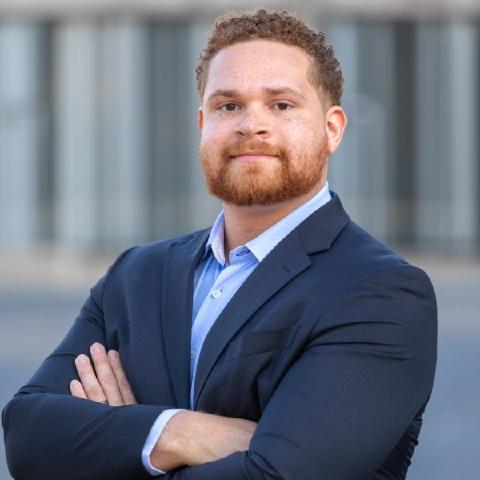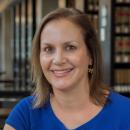Caleb Jeffreys, ’24: Advocating for a Client in Court for the Criminal and Juvenile Justice Clinic
Caleb Jeffreys, ’24, participated in the Criminal and Juvenile Justice Clinic (CJJC) this past year, where he was part of the legal team that achieved a not-guilty verdict in a juvenile trial case. The charges against their young client were serious, making the clinic’s victory truly life-changing. It was an experience that inspired Jeffreys to want to become a trial attorney. In this Q&A, he talks about the work he did for the case, what it was like to stand up in court, and what he has learned about being an advocate.
Why did you select this clinic?
I loved my experience in the Federal Criminal Justice Clinic working on a compassionate release case with Professor Erica Zunkel. Professor Zunkel has been a great mentor to me in law school and she was moving over to the CJJC. I wanted to continue working with her and also get the opportunity to work on a state criminal trial with Professor Herschella Conyers, ’83.
Can you describe the kind of work you did while working on this case?
Like my classmates, I was responsible for many moving parts of this case. My primary responsibility was to conduct a direct examination of one of our key defense witnesses. I was also responsible for drafting the cross examination of one of the State’s witnesses and a direct examination of one of our expert witnesses. In addition, I picked up other tasks like reviewing discovery, preparing exhibits, and drafting witness subpoenas. The entire team was heavily involved in strategizing and supporting each other in our individual responsibilities. It was amazing to see our zealous advocacy result in a not-guilty verdict for our client. It was an intense four-day trial with many ups and downs, but our teamwork and amazing clinical faculty secured a victory for our client and his family.
How did you prepare for your direct examination of a key witness?
It involved multiple rounds of drafting and revising direct examination questions with the clinical professors. The most rewarding part of this responsibility was the witness prep, where we met with our witness about her testimony. We also mooted my direct examination multiple times with the team. The hardest part of preparing was anticipating the State’s objections and cross examination. Professor Conyers and Professor Zunkel were amazing at preparing me for the tough and fast-paced nature of a prosecutor’s objections. In addition, I would not have been as prepared without CJJC Legal Assistant Kyla Norcross’ great administrative and strategic support.
What was the experience like for you to stand up in court?
I was definitely nervous to stand up and conduct my first direct examination. I was the first student to do their direct examination, so I knew I had to set the tone and elicit the testimony we needed from our witness. The months-long trial prep and my experience in the Intensive Trial Practice Workship helped ease my nervousness because I trusted my preparation. Cook County Juvenile Court is a chaotic venue to try a case, and the chaos eased my anxiety because I knew that even if I made a mistake, it wasn’t going to be fatal to our case. It was intense to get bombarded by the prosecutors with objections, but my preparation helped me respond to the objections and maintain my composure.
How did it feel to get the not-guilty verdict?
One of the best memories from my time at UChicago Law was getting hugs from my client and his mother after the not-guilty verdict. Our client’s family was strong and kind during the trial, and even packed lunches for the entire team. I could tell that they genuinely appreciated us for fighting for him in court.
What are your biggest takeaways from working on this trial?
My biggest takeaway is that I want to do trial work. This was my first real trial experience, so I didn’t know if it would scare me away from being a trial attorney. It was an intense preparation process and a high-pressure situation, but I enjoyed the challenge and fighting for our client. I learned that trials are high-stakes endeavors where all the pieces matter. It was exhilarating to strategize about how to best present our case and poke holes in the State’s case. It was also eye-opening to see how the clinical faculty, particularly CJJC Social Worker Lindsay Weinberg Perlmutter, took care of our client and explained the process to him. I learned that it’s incredibly important how the judge sees your client throughout the trial, and a crucial component of that is caring for your client’s emotional needs.
How has this experience changed your view of the law, the legal system, and/or your role as an advocate?
Most juvenile cases don’t get a team of law students and top-tier litigators to focus on their case for years. Most juvenile cases don’t feature multiple defense expert witnesses. Most juvenile cases don’t even go to trial. I’ve realized that time is a litigator’s greatest asset, and preparation makes or breaks a case. I wish every client could have the resources we were able to put into this case, because lawyers can truly change lives, one client at a time.
What would you say to a fellow student considering enrolling in the clinic?
Do it! Not every case you will work will be a major victory like this, but the experience of being an advocate for young people in the Cook County court systems alongside experienced litigators is invaluable. It’s an incredible way to get hands on legal experience while learning from great attorneys and dedicated students. Professor Zunkel will be leading the clinic next year and she is an amazing teacher and mentor for anyone looking for hands-on legal experience.
What are your plans after graduation?
I will be clerking for the United States Court of Appeals for the Seventh Circuit for two years.
Other than clinic involvement, what has been your favorite UChicago Law experience so far?
Being a part of the Black Law Students Association.

